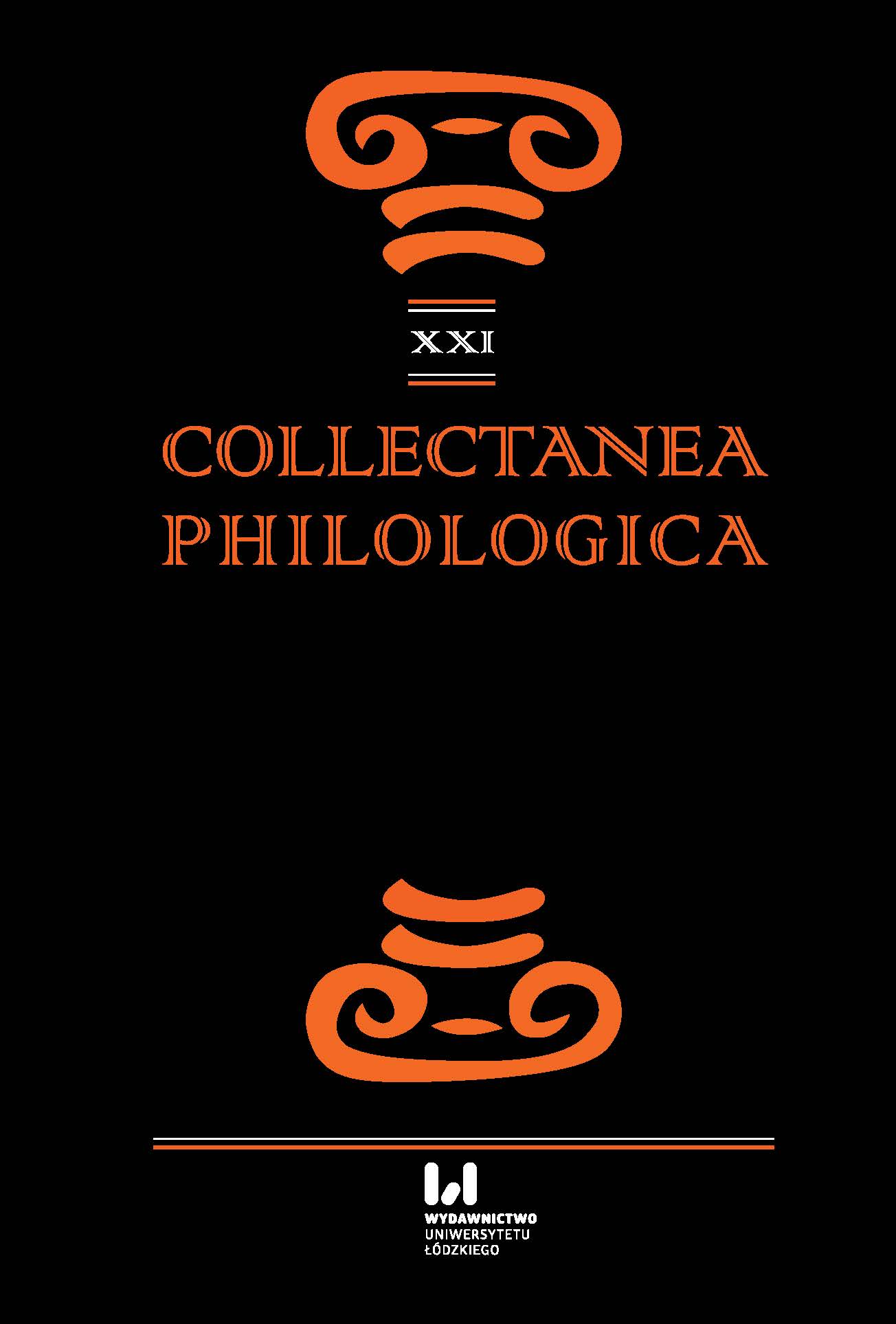Ksantypa – dobra żona Sokratesa
DOI:
https://doi.org/10.18778/1733-0319.21.05Słowa kluczowe:
wife of Socrates, Plato, Xenophon, letter from Pseudo-XenophonAbstrakt
After the death of Socrates, anecdotes and distorted stories about the philosopher’s family life and the unbearable character of his wife, Xanthippe, circulated in the general quasi literary circle. These stories were willingly read in subsequent epochs. Eventually, they preserved the model of the hellcat wife in the shape of Xanthippe, to which we still eagerly refer to. But did Socrates’ wife really deserve such a bad opinion? Is it possible for such a rating to be given by the desultory information we owe to Plato (Phaed. 60a) and Xenophon (Mem. II 2, Conv. II 10)? When attempting to defend the Xanthippe, an important source turned out to be a letter from Pseudo-Xenophon (vel Pseudo-Aeschines), which allowed us to look at the philosopher’s wife as his pupil, leading life according to Socrates’ teachings and surrounded by the care of his friends (Epist. XXI, Hercher 1873: 624).
Bibliografia
Albert, K. (1991). O platońskim pojęciu filozofii. Przeł. J. Drewnowski. Warszawa: PAN Instytut Filozofii i Socjologii.
Google Scholar
Augustyniak, P. (2011). „Anamnezą poza metafizyką duszy. Transcendentalny sens teorii idei w Fedonie Platona”. Principia, [online] 54–55, 7–24 (http://www.ejournals.eu/Principia/2011/Tom- 54-2011/art/1395/ [dostęp: 23.04.2018]).
Google Scholar
Boegehold A.L. (1999). When the Gesture Was Expected. A Selection of Exemples from Archaic and Classical Greek Literature. Princeton, New Jersey: Princeton University Press.
Google Scholar
Breitenbach, H.R. (1966). Xenophon von Athen. Stuttgart: Alfred Druckenmüller Verlag.
Google Scholar
Burnet, J. (ed.) (1911). Plato’s Phaedo. With Introduction and Notes. Oxford: Clarendon Press.
Google Scholar
Dąmbska, I. (1975). Zagadnienie śmierci w greckiej filozofii starożytnej, [w:] I. Dąmbska (ed.). Znaki i myśli. Wybór pism z semiotyki, teorii nauki i historii filozofii. Warszawa: Państwowe Wydawnictwo Naukowe. 119–129.
Google Scholar
Gilhuly, K. (2011). The Feminine Matrix of Sex and Gender in Classical Athens. Cambridge: Cambridge University Press.
Google Scholar
Głombiowski, K. (2008). Czy w stosunku do „Cyropedii” Ksenofonta ma rację bytu krytyka historyczna (na przykładzie opisu bitwy pod Thymbrarami – Cyr. VII 1)?, [w:] A. Marchewka (ed.). „Rem acu tangere”. Studia Interdisciplinaria ad Linguam et Litteras Graecorum Antiquorum Pertinentia. Gdańsk: Wydawnictwo Uniwersytetu Gdańskiego. 143–153.
Google Scholar
Hercher, R. (ed.) (1873). Epistolographi Graeci. Parisiis: Editore Ambrosio Firmin Didot.
Google Scholar
Joël, K. (1901). Der echte und der Xenophontische Sokrates. Bd. 2, Hft. 2. Berlin: Gaertner.
Google Scholar
Ksenofont (1967). Pisma sokratyczne. Obrona Sokratesa. Wspomnienia o Sokratesie. Uczta. Przeł. i oprac. L. Joachimowicz. Warszawa: Państwowe Wydawnictwo Naukowe.
Google Scholar
Lönborg, S. (1949). “Socrates and Xanthippe”. Theoria XV, 198–204.
Google Scholar
Marchewka, A. (2010), „Humor w Cyropedii Ksenofonta”. Symbolae Philologorum Posnaniensium Graecae et Latinae XX/2, 27–38.
Google Scholar
Marchewka, A. (2011), Socratic Laughter in the Xenophon’s “Cyropaedia”, [w:] B. Burliga (ed.). Xenophon: Greece, Persia, and Beyond. Gdańsk: Akanthina.
Google Scholar
Mróz, T. (2016), „Stefana Pawlickiego obrona Ksantypy”. Zeszyty Historyczno-Teologiczne. Rocznik Zmartwychwstańców, [online] 22, 123–138. http://pers.uz.zgora.pl:7777/skep/docs/F-1558980474/ZHT_22(2016)-MROZ.pdf [dostęp: 5.05.2018].
Google Scholar
Mueller-Goldingen, Ch. (2007). Xenophon. Philosophie und Geschichte. Darmstadt: Wissenschaftliche Buchgesellschaft.
Google Scholar
Pomeroy, S.B. (2015). Goddesses, Whores, Wives and Slaves. Women in Classical Antiquity. London: The Bodley Head.
Google Scholar
Reale, G. (1993). Historia filozofii starożytnej. Od początków do Sokratesa. T. I. Przeł. E.I. Zieliński. Lublin: Redakcja Wydawnictw Katolickiego Uniwersytetu Lubelskiego.
Google Scholar
Rosenmeyer P.A. (2001). Ancient Epistolary Fictions. The Letter in Greek Literatur. Cambridge: Cambridge University Press.
Google Scholar
Sauppe, G. (1971). Lexilogus Xenophonteus sive Index Xenophontis Grammaticus. Hildesheim– New York: Georg Olms Verlag.
Google Scholar
Sykutris, J. (1933). Die Briefe des Sokrates und der Sokratiker. Paderborn: Verlag Ferdinand Schöningh.
Google Scholar
Vicaire, P. (1983). Platon. Œuvres complètes. T. IV, p. 1: Phédon. Paris: Les Belles Lettres.
Google Scholar
Witwicki, W. (przeł. i oprac.) (1958). Platona Fedon. Warszawa: Państwowe Wydawnictwo Naukowe.
Google Scholar
Xenophon (1910). Xenophontis Scripta Minora. Fasc. 1. Th. Thalheim (ed.). Lipsiae: B.G. Teubner.
Google Scholar
Xenophon (1969). Xenophontis Commentarii. C. Hude (ed.). Stutgardiae: B.G. Teubner.
Google Scholar
Pobrania
Opublikowane
Jak cytować
Numer
Dział
Licencja

Utwór dostępny jest na licencji Creative Commons Uznanie autorstwa – Użycie niekomercyjne – Bez utworów zależnych 4.0 Międzynarodowe.












